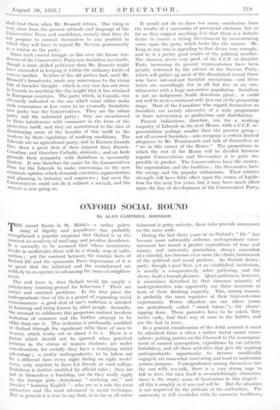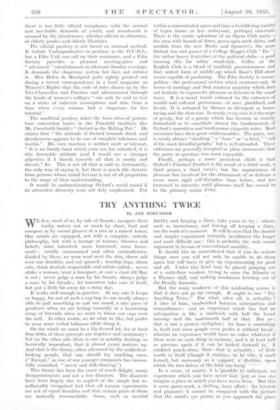OXFORD SOCIAL ROUND
' By ALAN CAMPBELL JOHNSON
THE recent fracas in St. Hilda's—a rather paltry story of dignity and impudence—has probably strengthened a popular suspicion that Oxford is at the moment an academy of mad orgy and peculiar decadence. It is normally to be assumed that where immaturity dwells in multitudes there will be a steady crop of indis- cretion ; yet the contrast between the routine facts of Oxford life and the spasmodic Press impressions of it is so great that the informed and the misinformed are .unlikely to co-operate in advancing the cause of enlighten- ment. '
The real issue is, does. Oxford social life supply a satisfactory training-ground for behaviour ? There are initial and constant problems. In the first place the undergraduate time of life is a.period of expanding social 'consciousness—a good deal of one's ambition is satisfied n knowing and being known by other people. Secondly, the attempt to sublimate this, gregarious instinct involves imitation of manners and the further attempt to be Older than one is. This imitation is profoundly modified • at Oxford through the significant, ratio there of men to Women, ,which works out at about 5 to I. There is a factor which should not be ignored when practical Worms in the status of women .students are under consideration, for socially 'they have a terrifying initial advantage ; a pretty undergradnette, to be taken out by a. different man .every night, during an eight weeks' term, only requires to ,have 2.5 ,friends at each college. Imitation is further Modified by. official rules ; they are not in themselves a hardship, nor do they really apply to the foreign girls—Americans " studying art," and Swedes " learning English "—who are as a rule the most • attractive and the most advanced in social technique. But in general it is true to say that, in as far as all enter- tainment is petty activity, these rules provide annoyance on the same scale.
During the last three years or so Oxford's " life " has become more noticeably arduous, undergraduate enter- tainment has meant a greater expenditure of time and Money, and university journalism, always somewhat Of a scandal, has become even more the choice instrument of the political and social pushers. An Oxford sherry- party, though a post-War, yet an established, institution, is usually • a comparatively sober gathering, and the sherry itself a formal pleasure. Quiet politeness, however, is sometimes disturbed • by that tiresome minority of undcrgraduettes who apparently use these occasions as tests of their drinking capacity. This, among women, is probably the most repulsive of their trial-and-error experiments. Worse offenders are our elders (some are gratuitously called " moral tutors ")—the sherry- sipping dons. These parasites have to be asked, they arrive early, find their way at once to the bottles, and are the last to leave.
In a general consideration of the debit account it must be admitted there is often a rather foetid moral atmo- sphere; petting parties on the Cherwell to the accompani- inent of canned syncopation, expeditions by car (strictly forbidden), and all those activities that give the aspiring 'undergraduette opportunity to become unofficially engaged, are somewhat enervating and tend to undermine serious purpose. Undergraduates among themselves tire the sun with sex-talk, there is a very strong urge to fall in love, the idea itself is overwhelmingly attractive, there is the empty sense of frustration in this respect.= ' all this is roughly as it was and will be. But the situation is `not improved by the attitude of the authorities. The university is still overladen with its monastic traditions, there is too little official compliance with the normal and inevitable demands of youth, and resentment is aroused by the interference, whether official or otherwise, of elderly prudes and elderly libertines.
The official prudery is not based on rational method. It forbids 'Undergraduates to perform in the O.U.D.S., but a Film Unit can call on their assistance, and a Film Society provides a pleasant meeting-place and " advanced " entertainment on alternate Sunday evenings. It demands the chaperone system but does not enforce it. Miss Helen de Mouilpied quite rightly pointed out during a recent correspondence in a local magazine on Women's Rights that the code of rules drawn up by. the Vice-Chancellor and Proctors and administered through the heads of women's colleges " can only be said. to rest on a series of indecent assumptions and date from . a time when every woman had a chaperone for her tutorial." . .
The unofficial prudery takes the form often of porten- tous conversion tracts in the Fairchild tradition like Mr. Crawfurth Smith's " Oxford in the Melting Pot." He claims that " the attitude of Oxford towards drink and drunkenness appears to be one of complete tolerance and inertia.". His own reaction is .neither inert or tolerant. " It is no family taint which your son has inherited, it is this damnable attitude (and • I would use a stronger adjective if I dared) towards all that is manly. • and decent," &e. This is not all that •is said or, fortunately, the only way of saying it,• but there is much idle rhetoric from persons whose moral fervour is out of all proportion to • the range of their understanding. • It would be underestimating Oxford's social round if its attractive diversity were not duly emphasised. For within a concentrated space and time a bewildering variety of types (more or less embryonic, perhaps) entertain. There is the exotic splendour of an Opera Club party— the men with beards of down, green open-neck shirts, and sandals from the new Marks and Spencer's ; the more blatant fun and games of a College Rugger Club " Do " the rather heavy festivities ,of the political clubs—a good training this for lobby small-talk. Coffee at the English Club is a blend of youthful precociousness and that ardent form of middle-age which Boar's Hill alone seems capable of producing. The Film Society is cosmo- politan—the professional section which murmurs only in terms of montage and that amateur majority which does not hesitate to express its pleasure or distaste in the usual ways.. It is a social round coloured • by the extremes of wealth and Cultural pretensions—at once pinchbeck and lavish. It is actuated by themes as divergent as horse- racing and the class war. In nearly every ease it is the reign of gossip, but of a gossip which has become so strictly formalised as. to constitute almost the fundamentals, of Oxford's unwritten and burdensome etiquette rules. Most occasions have their great undiscussables. The party, too, is nearly always "shocking," a." bore " or "a frost," "full of the most dreadful people," but is well attended. These criticisms are generally accepted as plain statements that the party in question was most enjoyable.
Finally, perhaps • a more . persistent cliché is that Oxford's Finished Product is the result of a, third work, a third games, a third social ; but the .organisation of pleasure has involved for the attainment of so delicate a mean more. rigid self-discipline than . before, and has increased in intensity until pleasure itself has ceased to be the primary, raison d'elrc.



































 Previous page
Previous page